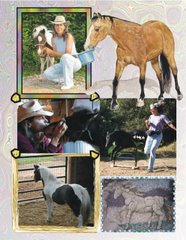Animals and humans alike naturally want to regulate and keep the good things happening and the bad things at bay. When good things happen to us, we tend to want to control how and why those good things happen, especially if we're not sure why they happened in the first place. We see an event as lucky and want more of where that came from.
Sometimes we think that something in our environment or the surrounding circumstances was a contributing factor when we successfully got what we wanted.
For example I recently heard of a major league baseball team who started to grow a garden of hot peppers in the bullpen. They did this because they had recently been enjoying a winning streak and had associated part of the luck of this winning streak to eating hot peppers. One player had even taken the pepper eating ritual to the point of being physically ill. No matter, the team was bound up in this association between the peppers eating and winning.
I know some of you who don't follow baseball will laugh at this story, but it is quite common. Animals can also add little bits of behavior not really related to our overall training goal. In training literature, this is called a superstitious behavior.
The reason these extra behaviors develop is the same. Horses want control over the good things that happened to them. They tend to repeat little gestures that are associated with the overall behavior they're learning.
So the next time you see your horse with his ears back or shaking his head or doing something you're not certain how it happened, you might take a look at your overall training program and see if somehow this behavior is being reinforced accidentally. It may be a little gesture the horse made while he was learning and then he decided he needed to repeat that in order to get you to click. It was his "good luck charm" behavior.
This takes more overall observational skills because you need to not only watch the efforts your horse makes towards what you're training, but you need to watch for any little behavior that begins to repeat that is NOT a part of your overall goal.
Sometimes we think that something in our environment or the surrounding circumstances was a contributing factor when we successfully got what we wanted.
For example I recently heard of a major league baseball team who started to grow a garden of hot peppers in the bullpen. They did this because they had recently been enjoying a winning streak and had associated part of the luck of this winning streak to eating hot peppers. One player had even taken the pepper eating ritual to the point of being physically ill. No matter, the team was bound up in this association between the peppers eating and winning.
I know some of you who don't follow baseball will laugh at this story, but it is quite common. Animals can also add little bits of behavior not really related to our overall training goal. In training literature, this is called a superstitious behavior.
The reason these extra behaviors develop is the same. Horses want control over the good things that happened to them. They tend to repeat little gestures that are associated with the overall behavior they're learning.
So the next time you see your horse with his ears back or shaking his head or doing something you're not certain how it happened, you might take a look at your overall training program and see if somehow this behavior is being reinforced accidentally. It may be a little gesture the horse made while he was learning and then he decided he needed to repeat that in order to get you to click. It was his "good luck charm" behavior.
This takes more overall observational skills because you need to not only watch the efforts your horse makes towards what you're training, but you need to watch for any little behavior that begins to repeat that is NOT a part of your overall goal.




No comments:
Post a Comment